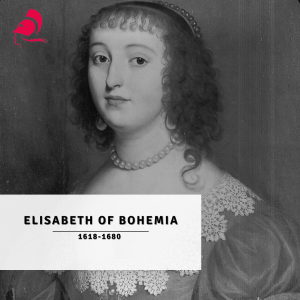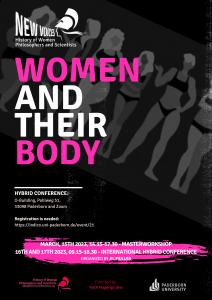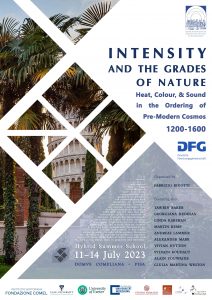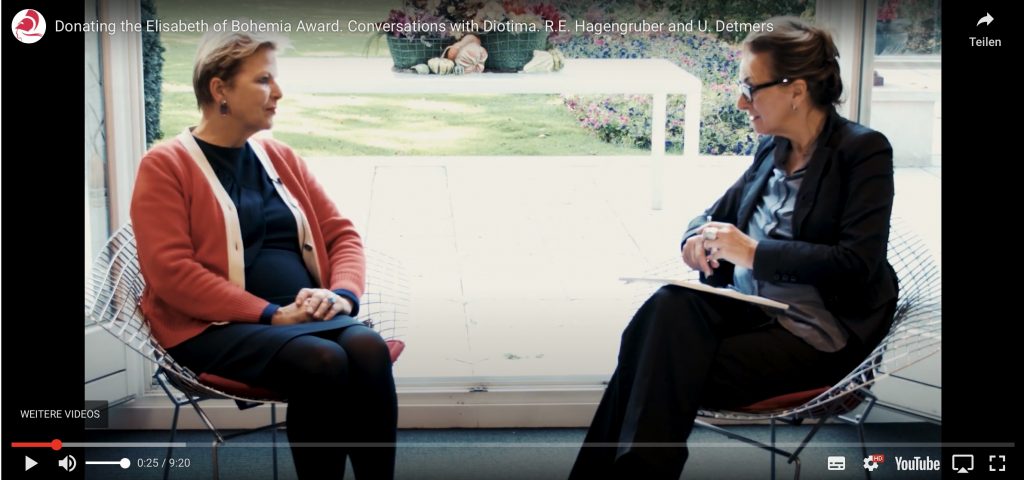A history in half.
We need the legacy of women philosophers.

“Your letters, when they do not teach me, always serve me as the antidote to melancholy, turning my mind from the disagreeable objects that come to it every day to the happiness that I possess in the friendship of a person of your merit, to whose counsel I can commit the conduct of my life.”
Letter to Descartes on the 22nd of June 1645
– Princess Elisabeth of Bohemia and René Descartes, The correspondence between Princess Elisabeth of Bohemia and René Descartes, edited and translated by Lisa Shapiro, Chicago & London, The University of Chicago Press, 2007, p. 93

On February 8th, 2023, Dr. Jil Muller gave an online lecture on Melancholy and Fever in the Early Modern Period, in the online programme organised by the cooperation partner of the Center for the History of Women Philosophers and Scientists, the Center for the Study of Medicine and the Body in the Renaissance in Pisa.
In this lecture, she spoke about the medical and philosophical texts from the early modern period, in which one can notice a huge interest in melancholy, the ‘fashionable’ evil of that time, confining great minds to sadness and depression. Her focus was on Montaigne and Descartes, and the role they attributed to the mesentery in melancholy. For Descartes, Jil Muller more precisely referred to Elisabeth of Bohemia’s understanding of melancholy and her weak body, since it is above all she who tells Descartes about her suffering and thus offers the philosopher the opportunity to reflect on the connections between body and mind in melancholy and in fever.
If you want to learn more about Elisabeth’s melancholy, you can listen to the online lecture here.

Female bodies, medical cases and diseases will also be one of our main topics at our huge, international, hybrid Conference Women and their body. We will hear 9 different talks bringing light to this important subject: Amalia Cerrito, Theoretically contended: the female body in 13th-century theology, anthropology, and natural philosophy (16.03.2023, 11.45); Amber L. Griffioen, Losing a Part of You? On the Philosophical Relevance of Miscarriage and other Forms of Pregnancy Loss (12.15); Julia Schneider, Female Reproductive Bodies and the Shift from Risk to Threat Society (14.00); Stella Villarmea, A New Logos for Genos: Approaching a Philosophy of Birth (14.30); Sarah Pawlett-Jackson, Menstrual temporality: Cyclic bodies in a linear world (15.00); Carlota Serrahima, The experience of dysmenorrhea (15.45); Ainhoa Rodriguez, Been Seen whilst hidden (16.15); Paula Muhr, Current Neuroimaging Research into Hysteria and its Ambiguous Relation to the Traumatised Female Body (16.45); and Urszula Lisowska, The Politics of the Thyroid. Re-Claiming One’s Own Metabolism (17.30).

If you are interested in Renaissance medicine and the understanding of Heat, Colour and Sound, you can have a look at the Summer School Program of the CSMBR. The Summer School takes place from 11th to 14th July 2023: https://csmbr.fondazionecomel.org/events/the-intensity-of-nature/
Since 2018, the Center for the History of Women Philosophers and Scientists, in cooperation with Prof. Ulrike Detmers, awards every year the Elisabeth of Bohemia Prize. Ist is intended to acknowledge an internationally known scholar whose work best preserves the memory of women in philosophy. Last year it went to Prof. Sarah Hutton. The video of the Award Ceremony can be watched here.
More information about Elisabeth of Bohemia and many other female philosophers and scientists can be found in our Directory. It gives an overview of women philosophers and scientists from approx. 2300 BCE to the 21st century. Currently, there are more than 280 names of women philosophers listed and the entries will be periodically updated with biographical information and sources for further research.
Feel free to follow us on social media for regular updates: Facebook, Instagram and YouTube.
You cannot copy content of this page









